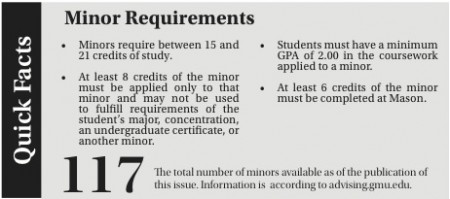Adding a minor to a bachelor’s degree is one way to fulfill elective credit requirements.
Whether students want to add to their degree or learn more about a secondary interest, there are more than 100 minors at Mason to choose from, with more added every year.
“There’s been a tremendous amount of growth in minors since they started them,” said Paul Bousel associate director, Academic Advising & Transfer Center.
Although there are currently more than 100 minors offered at Mason, the minor program has not been around too long. 1990-1991 was the first catalog year to provide minor programs of study.
“I was here before there were minors. There was a time when we didn’t have minors,” Bousel said.
When students seek help from Mason’s Academic Advising and Transfer Center to decide on a major, minors are not always brought up in conversation.
Paul Bousel, associate director of the Academic Advising and Transfer Center focuses more on the transition of students from undeclared majors to actual majors of study.
“We don’t insist on anyone doing a minor. It’s an option. You don’t have to pick a minor,” Bousel said.
The requirements to obtain a minor include taking 15-21 credits of courses in the field of study.
As a result, students who pick up a minor should plan ahead of time.
“If you do a minor, you’ll be here beyond 120 credits, which you can do, but many people don’t want to stay here longer than they have to,” Bousel said.
There are some minors that involve more credits than others.
A foreign language minor requires intermediate courses prior to choosing the language as a minor. According to the Academic Advising and Transfer Center, if you are a student who has not been exposed to a language such as Chinese, you would have to take 12 credits of Chinese coursework before taking courses for the Chinese minor. In completing the Chinese minor, students would have 27 credits of Chinese language courses, 18 of them will come out of your elective credits.
“Somebody who is a senior with six elective credits left wouldn’t be able to do the Chinese language minor unless they plan to stay here longer,” Bousel said.
Transfer students and students who switch majors may not have enough room within their elective credit courses to pursue a minor.
However, majors such as communication and economics in the College of Humanities and Social Sciences allow room for students to pursue a minor because there are a lot of electives available.
Resources such as Career Services and the Academic Advising and Transfer Center provide information on career paths for the various programs of study that Mason offers.
For students who wish to supplement their degree to make themselves more specified for the job market, minors can have a positive effect.
“We suggest that students don’t assume they can’t do anything with their degree. If someone is looking for [a minor], the IT minor might make you a little more marketable. You might have skill settings in information technology that you wouldn’t get otherwise,” Bousel said.
The information technology minor was started by a history professor at Mason in order to allow students to become more marketable.
“The information technology along with the Mathematics for School of Management Students minor (MSOM) are two of the popular minors provided at Mason,” Bousel said.
It is known for students to change their major throughout their college experience.
This is also true for minors. If students no longer feel that they need to continue a minor, they can change or drop their minor.
It would then become a regular elective course. Students could also obtain a double minor if they choose.
“You don’t have to have one to graduate. Some students do the coursework and declare the minor later on. You’re not locked into anything,” Bousel said.







Comments